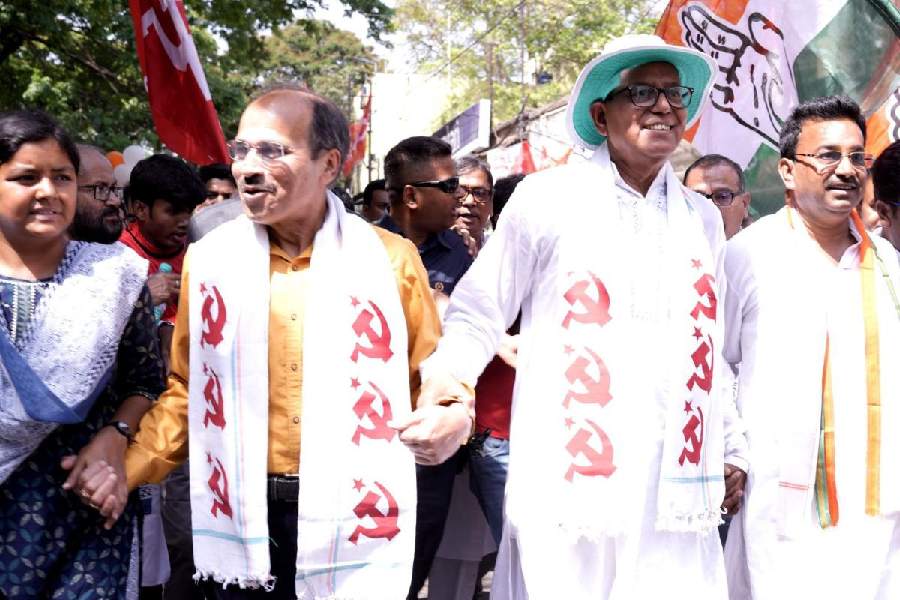With the merciless April sun beating down on the historic plains of Murshidabad — a nucleus of Bengal polity since Shashanka in the seventh century to Siraj ud-Daulah in the 18th century — Adhir Ranjan Chowdhury and Md Salim were seen in public together, at long last, this election summer.
In a hammer-sickle-star uttoriyo, a beaming Chowdhury — the Congress’s leader in the Lok Sabha and its Bengal unit chief — was seen next to CPM state secretary Salim in a first since the election notification, when the former showed up in Murshidabad on Thursday, for the nomination-filing of the latter.
“We are fighting together across Bengal, and we will show up for each other. Simple as that,” said Chowdhury, the Behrampore candidate.
Although both INDIA partners managed to finalise an arguably precarious, eleventh-hour seat-sharing understanding in 40 of the 42 Bengal seats, the negotiations over the past few weeks took place over phone calls and an exchange of chits between Bidhan Bhavan and Alimuddin Street.
With Salim expected to turn up at Chowdhury’s nomination-filing in a day or two, some in both parties hoped there would be more joint public appearances and activities now at least, going into the business end of the election season.
“Salim and Adhir seem to be focused on nothing but winning these two seats, Murshidabad, and Behrampore, respectively,” says a former senior functionary in the Congress state unit.
A source in the Congress said Chowdhury militantly opposed a truck with Mamata Banerjee, which is why the party was left with the Left in Bengal.
“But, thereafter, he barely did anything to ensure a proper, seamless alliance with them,” he said.
“The parleys, much like 2019 and 2021, were lackadaisical and immature,” he added.
A senior in the state unit, also not known for his proximity to Chowdhury, said the real objective of INDIA had to be to ensure the BJP got as few of the 42 Bengal seats as possible. To that end, he said, there was no point in repeatedly throwing a spanner in the works to dilute Mamata’s chances here.
“Instead of winning those two or four in alliance with Mamata, we are in a position where we will contest in a dozen seats and might win zero,” said the veteran, referring to the fact that about a third of the Bengal electorate is Muslim, and the Congress support base in the state has long been reduced to a handful of seats in central and north Bengal with substantial Muslim population.
Mamata, dismayed with the Congress’s inordinate delay in sealing the seat-sharing deal and the Left’s fierce resistance — which Chowdhury too publicly echoed repeatedly — to any understanding with her, had pulled the plug on INDIA in Bengal and decided to contest alone here.
But the two on-again, off-again partners (since 2016) inexplicably sat back till the Election Commission on March 16 announced that the seven-phase polls would start on April 19.
“All we got to know was some informal dialogue taking place between Salim, sometimes also Bimanda (Front chairman Biman Bose), and Adhir,” said a senior CPM leader.
Chowdhury corroborated this CPM leader’s claim, saying: “They are yet to hold formal talks with me or the AICC. I once spoke to Salimbhai.”
While the Left held routine meetings to decide its candidates, there was no sign of
any formal dialogue with the Congress and Nawsad Siddique’s ISF. The ISF — which the Congress never managed to trust — withdrew from the possibility of a pact days ago, leaving the Left in the lurch.
“We wanted to have an understanding with the ISF... They wanted many (20-22) seats,” Bose said, when told that Bhangar MLA Siddique was holding the CPM responsible for the failure.
Left allies sounded clueless. CPI state secretary Swapan Banerjee, when asked what was wrong with the seat-sharing negotiations, said: “We are not in any dialogue with the Congress, the talks are taking place between them and the CPM.”
The lack of intent among junior Left partners for a seat understanding with parties outside the Front was rooted in their fear of having to make sacrifices.
Bose discussed the extent of sacrifice Front allies would have to make.
Admitting that giving up seats was not easy for anybody, Salim said: “There was no ready-made solution.... We were working on a formula, and trying to stitch together an alliance.”
As the seat-sharing journey was far from smooth, precious little was done to make the deal bear fruit on the ground.
“Nineteen days later, today, Adhir showed up for Salim. Nothing substantial in between,” said a Bidhan Bhavan senior, not factoring in rare exceptions, such as the Congress’s chief spokesperson for Bengal, Soumya Aich Roy, campaigning for the CPM’s Srijan Bhattacharya in Jadavpur.
“A coordination mechanism between the two sides would have helped avoid these issues. Maybe in 2026 (Assembly elections),” said a young CPM state committee member.
Murshidabad votes on May 7

